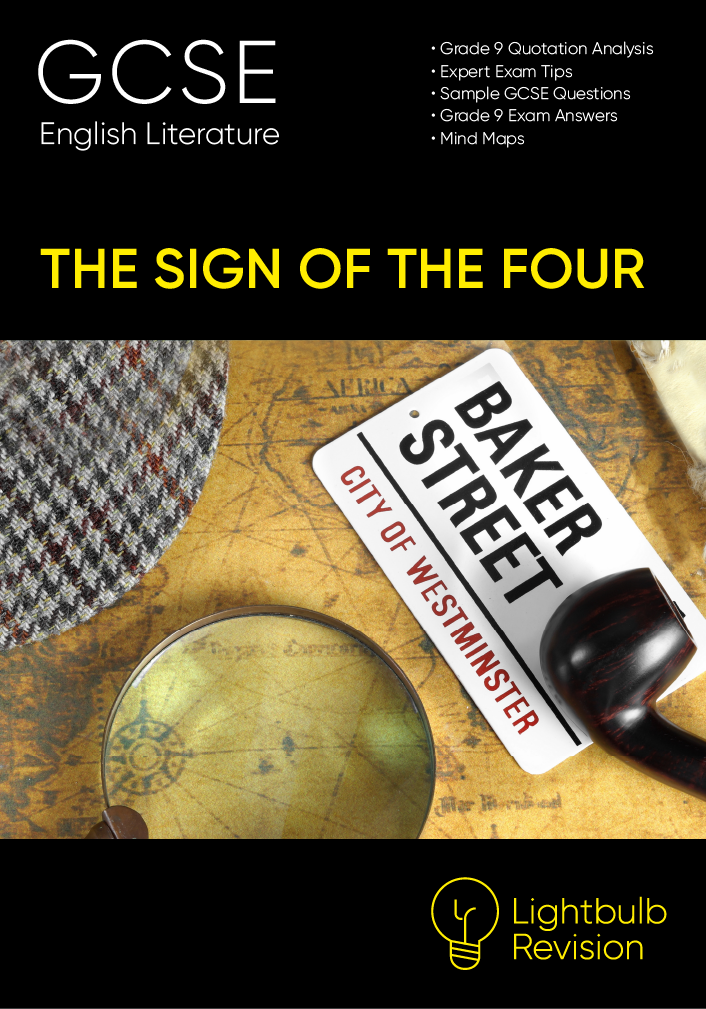Punishment & Justice
GCSE Exam Question & Answer
Read the following extract from Chapter 4: The Story of the Bald-Headed Man. Answer both questions below the text.
At this point in the story, Sholto is telling his sons the story of how Morstan died and the actions he took to conceal this death.
“ ‘For a long time I sat half distracted, wondering what I should do. My first impulse was, of course, to call for assistance; but I could not but recognize that there was every chance that I would be accused of his murder. His death at the moment of a quarrel, and the gash in his head, would be black against me. Again, an official inquiry could not be made without bringing out some facts about the treasure, which I was particularly anxious to keep secret. He had told me that no soul upon earth knew where he had gone. There seemed to be no necessity why any soul ever should know.’
‘I was still pondering over the matter, when, looking up, I saw my servant, Lal Chowdar, in the doorway. He stole in and bolted the door behind him. “Do not fear, Sahib,” he said. “No one need know that you have killed him. Let us hide him away, and who is the wiser?” “I did not kill him,” said I. Lal Chowdar shook his head and smiled. “I heard it all, Sahib,” said he. “I heard you quarrel, and I heard the blow. But my lips are sealed. All are asleep in the house. Let us put him away together.” That was enough to decide met. If my own servant could not believe my innocence, how could I hope to make it good before twelve foolish tradesmen in a jury-box? Lal Chowdar and I disposed of the body that night, and within a few days the London papers were full of the mysterious disappearance of Captain Morstan. You will see from what I say that I can hardly be blamed in the matter. My fault lies in the fact that we concealed not only the body, but also the treasure, and that I have clung to Morstan’s share as well as to my own. I wish you, therefore, to make restitution.’
a) Discuss how crime, punishment and justice are presented in this extract.
b) Discuss how crime, punishment and justice are presented in the novel as a whole.
Make the point that we all have the potential to commit a crime
Major Sholto is a British officer and a Victorian gentleman yet even he places himself outside society’s laws by concealing the body of Captain Morstan. It is the base human emotion of greed that motivates him as he states that ‘I was particularly anxious to keep (the treasure) secret’. His greed ensures that he carries out the morally and legally wrong action of hiding the body; this greed is a strong motivator for other characters in the book. Small tells the story of how he joined the men at Agra fort in murdering for the treasure as his ‘heart set as hard as a flint’. The simile shows how desire for money can corrupt us and turn us to crime. ‘Flint’ is a grey, incredibly tough stone and Conan Doyle explores how any of Small’s natural goodness and morality completely disappears in the temptation of acquiring great wealth. It illustrates how ordinary people can be drawn into terrible crimes. It is interesting to see how quickly Lal Chowder involves himself in the crime as ‘he stole in and bolted the door’; the verbs suggest a deliberate slyness, again perhaps showing how quickly we can lose our morals and turn to crime.
Move on to the point that justice is seen an important in the novel
There is a theme of justice that runs through the novel; even Major Sholto is aware that he has committed a crime by hiding the treasure from Miss Morstan and declares his intention of making amends, saying: ‘I wish you, therefore, to make restitution’. He wants to do the right thing, even if it is at the very end of his life. The theme of justice is explored elsewhere in the novel when Tonga is shot by the police, Holmes and Watson who pursue him as ‘our pistols rang out together’. There is a natural justice here- blood for blood- as Tonga is guilty of the murder of Bartholomew Sholto. Yet Tonga is shot down like a wild animal without being able to give his version of events and a modern reader in particular might question how much justice is served to Tonga, a stranger in a hostile land where he is given no chance to explain himself.
Make the point that there seems to be concern over the effectiveness of the justice system
Major Sholto clearly has little faith in the justice system, saying ‘if my own servant could not believe my innocence, how could I hope to make it good before twelve foolish tradesmen in a jury-box?’ The use of the dismissive adjective ‘foolish’ suggests that he doubts that he will receive justice in a court of law, and this fear of the ineffectiveness of the system pushes him into committing the crime of concealing Morstan’s dead body. Conan Doyle later seems to justify this lack of faith in his portrayal of the police force; Athelney Jones arrives at the murder scene, creating an awful lot of noise with ‘heavy steps… loud voices… loud crash’. Jones is the representative of the police force in ‘The Sign of the Four’ and he is portrayed here as incompetent; we question how much justice Jones will deliver.
Explore how punishments are portrayed in the novel
Within most societies, decisions on how to punish criminals is a matter of debate and Conan Doyle offers insights into this controversial topic throughout ‘The Sign of the Four’. Small declares that ‘I cared nothing for the law… nothing for the gallows’. Small shows that law and punishment have no effect on him and the repetition of the word ‘nothing’ reveals how dismissive he is of the punishments that Victorian society used as deterrents. Victorians believed capital punishment (the death penalty) was a successful discouragement to crime, but here we see Jonathan Small’s greed takes him beyond care of society or its punishments. However, at the start of the novel, Holmes tells Watson of a vicious criminal, ‘the most winning woman… hanged for poisoning three little children for their insurance money’,exploring the idea of duality: this woman is socially pleasant (‘winning’) but capable of terrible crime. Holmes’ cold factual vocabulary makes the crime all the more shocking; the only emotive word is the adjective ‘little’ which highlights the youth and vulnerability of the children. Conan Doyle is ensuring that we are aware of the evil that humanity is capable of from the beginning of the novel. There is the reassurance for the reader that this vile criminal was suitably punished by being ‘hanged’. Justice for the murdered children is delivered by the state.
Explore whether Conan Doyle shows any sympathy for the criminals
Conan Doyle paints a vivid picture of Small’s experiences at Agra Fort which were a ‘perfect hell’. In the chaos and bloodshed of the Mutiny, there are mitigating (excusing) circumstances for the murder that Small commits as who knows how desperate we would be or what we would have done in the same situation? There also seems to be criticism of the harsh penal system in the description of the Andamans where Small was ‘chained up in the filthy convict huts, bitten by mosquitos… bullied by every cursed black-faced policeman’. The list captures the range of suffering while the vicious verbs reflect the violence and pain with which the prisoners were treated; the overall effect is of an inhumane prison system which brutalises the prisoners. However, Conan Doyle concludes his novel with a major triumph for Holmes and a public triumph for Jones; the moral of the story is very clearly that crime does not pay and those who break the law will rightly pay the consequences. Tonga pays with his life while Small is destined to convict labour ‘digging ditches in Dartmoor’. The readers are reassured that justice has been served and that Victorian Britain is a place where the guilty will be found and punished, and, if a man is innocent, then he is protected by the law; in the words of Jones, ‘if he has done no wrong we shall see no wrong comes to him’.

Essential Exam Tips
-
Annotate the passage first. Underline any interesting language features and choose at least three quotations that will help you answer the question.
- Look for strong words, phrases and images in the extract and try to write about the effect that these have.




